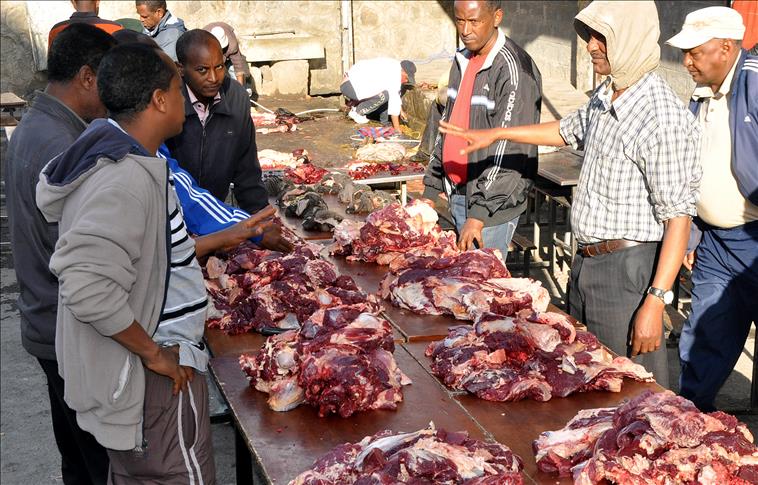Ethiopians celebrate end of Lent, welcome back meat
On Easter, Ethiopians, who had refrained from eating meat for almost two months, seem eager to make up for the meatless days

By Seleshi Tessema
ADDIS ABABA
Like millions of Christians around the world, Ethiopians celebrate the Easter holiday with a sense of spiritual uplifting as the occasion marks the end of the Lent – the main fasting season.
But unlike other Christians, Lent here is not observed for 40 days, the period that Jesus Christ fasted in the wilderness at the start of his ministry.
The followers of the Ethiopian Orthodox (Tewahdo) church traditionally start fasting 15 days ahead of other Christians.
"During the added days we remain fasting not for our souls, but for the souls of others who could not observe Lent because of old age, illnesses, travels or many other compelling reasons," Alem Kassa, 69, told Anadolu Agency.
"In this way, we try our best to give thanks to the Lord Jesus Christ who suffered great suffering to wash the sin of our hands," added the housewife.
Deacon Belay Mekuria, who is in his mid-40s, has another reason for the prolonged fasting.
"We pay homage [this way] also to the saints, kings and patrons of our land."
On Easter, Ethiopian Orthodox Christians, who had refrained from eating meat for almost two months, seem eager to make up for the meatless days.
Meat is served in all forms of cuisine.
The most unique cuisine is meat served raw and gorged raw. In fact Ethiopians are known for their custom of eating meat raw.
A kilo of raw meat sells for up to 170 Birr at butchery houses. This is affordable only for the haves which constitute in fact a small portion of society.
The have-nots eat meat only occasionally because of the ever increasing cost of meat that is making life more difficult considering the fondness Ethiopians show for meat.
Spirit of Sharing
As the first rays of the new day crept across the streets of the sprawling capital, Ethiopian Christians flock to the slaughterhouses to have their share of meat from sacrificial lambs and bulls.
Butchers have already worked all night long from the dusk of Saturday to the dawn of Sunday to slaughter, skin and dissect sacrificial animals to hand over the piles of meat to their owners.
Traditionally, people form groups, contribute equal shares of money and buy bulls, which meat is equally divided among them.
Generous families, meanwhile, sacrifice additional lambs to give away in a traditional communal practice called "Qircha," which roughly means sharing.
"Qircha gives us the opportunity to come together, create to us a sense of togetherness in celebration of the holiday," Taye Habtemichael, who came to lend a hand at an area where a bull was being slaughtered, told AA.
"When we buy meat at the butcheries, we do not get all parts of the bull. But here we get a chunk of all the organs," he said happily as he walked away with his share of the bull meat.
englishnews@aa.com.tr
Anadolu Agency website contains only a portion of the news stories offered to subscribers in the AA News Broadcasting System (HAS), and in summarized form. Please contact us for subscription options.







